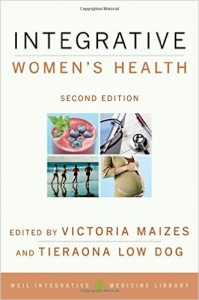Book Excerpt: Integrative Women's Health
 Title: Integrative Women's Health
Title: Integrative Women's Health
Authors:
Publisher: Oxford University Press; Second edition (December 4, 2015)
Ordering information: Amazon | Target
Nutrition is a cornerstone of health, and food is necessary for energy, growth, repair, and renewal. Hippocrates's dictum "Let food be thy medicine and medicine be thy food" still holds value today. The subject of nutrition is vast; and emphasis in this chapter will include the basics of nutrition—carbohydrates, proteins, fats, and water; key micronutrients; and the healthiest whole-food eating styles.
Carbohydrates
Carbohydrates ("carbs") can provide the bulk of the body's energy needs and are available in the form of starches, sugars, and fibers. When evaluating the health benefits of carbohydrates, the following questions are important to address:
- How is the carbohydrate processed? To what extent is the carbohydrate processed?
- What is the fiber content?
- What is the glycemic index/load?
Proteins
A common dietary concern for many women is getting enough protein. However, the average American diet provides ample, or even excessive, protein. The recommended daily allowance (RDA) of protein in women aged 13 and older (excluding pregnancy) is 46 g/day. For reference, a 3-ounce serving (size of a deck of cards) of chicken breast provides about 23 g of protein, 1/2 cup of firm tofu provides 20 g, and one slice of whole-grain bread about 4 g. Eating a well-balanced diet should provide plenty of protein.
The Skinny on Fats
There are three major categories of dietary fats—saturated, monounsaturated, and polyunsaturated—based on the number of double bonds within the lipid molecule. All fats found in nature are composite fats. For example, olive oil is 77% monounsaturated, but also contains 14% saturated fat and 9% polyunsaturated fats. High-quality fats are essential in the diet. While saturated fats have long been thought to increase the risk of heart disease, a recent meta-analysis revealed no increased risk of cardiovascular disease. Furthermore, more data is emerging about the different types (carbon chain lengths) of saturated fats. Long-chain saturated fats with carbon length of 16 or greater will raise TG levels and lower HDL, and short-chain saturated fats do not appear to have these effects. Meat and animal fats contain higher amounts of long-chain saturated fats, while plant sources such as coconut oil contain about 60% MCTs. Medium-chain TGs are more rapidly absorbed and can be burned by muscles and organs for immediate fuel.
Trans-fats are the big dietary "no-no." They increase serum levels of LDL, lipoprotein (a), TGs, and inflammatory mediators in women, and reduce HDL cholesterol. Foods containing trans-fats, usually in the form of partially hydrogenated fats, should be completely eliminated from the diet. While the data are mixed regarding saturdated, monounsaturated, and omega-6 fays, trans-fats are clearly associated with heart disease.
Don’t miss the opportunity to hear Victoria Maizes, MD speak at the Integrative Healthcare Symposium Annual Conference February 23-25, 2017 in New York City. Click here for more information.




















SHARE